
 |
||||||
|
GAY
FILM REVIEWS BY MICHAEL D. KLEMM
|
||||||
|
Beyond the Walls Strand
Releasing, Director/Screenplay: Starring; Unrated, 98 minutes |
Last Tango In Belgium
There’s nothing like the thrill of a new relationship before things get messy. Look at what happens to poor Paulo and Ilir. Beyond the Walls (Hors Les Murs) is a remarkable first feature set in filmmaker David Lambert’s native Belgium. A selection at Cannes, Beyond The Walls chronicles the dizzying highs and plummeting lows of a doomed tryst between two very different men. It is also a coming of age story of sorts; Paulo is an immature young man who is forced to grow up in a hurry. |
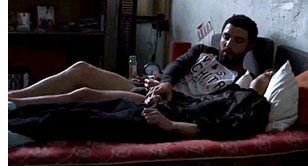 Paulo (Matila Malliarakis) is impulsive and doesn’t know what he wants. The film begins with Paulo passing out at a bar. While drinking himself into a stupor, he was also making some serious eye contact with the handsome bartender (Guillaume Gouix). His name is Ilir. He winds up carrying the drunk Paulo, over his shoulder, back to his apartment. His motives seem noble but he also wants to get laid. He tenderly lays Paulo on his bed and unbuttons the lad’s shirt and then his pants. But Paulo is unconscious and so Ilir rolls over and goes to sleep too. Paulo (Matila Malliarakis) is impulsive and doesn’t know what he wants. The film begins with Paulo passing out at a bar. While drinking himself into a stupor, he was also making some serious eye contact with the handsome bartender (Guillaume Gouix). His name is Ilir. He winds up carrying the drunk Paulo, over his shoulder, back to his apartment. His motives seem noble but he also wants to get laid. He tenderly lays Paulo on his bed and unbuttons the lad’s shirt and then his pants. But Paulo is unconscious and so Ilir rolls over and goes to sleep too. |
|
|
|
|
They bond over breakfast as Ilir nursemaids Paulo through his hangover. Ilir tells him that he is from Albania and that his name means “freedom” in France. They smile at each other a lot. Paulo admits to a girlfriend but is being very non-committal. Ilir understands immediately. “You’re still trying to figure it out, aren’t you?” he asks. Paulo goes back home. His girlfriend, Anka, is waiting for him and, judging by her welcome, this isn’t the first time this has happened. |
|
|
|
Paulo and Ilir meet again. Both are musicians. Paulo plays the piano accompaniment to silent films, and Ilir plays bass guitar in a band. Paulo goes to hear him perform. We watch Ilir through Paulo’s eyes. The rest of the band fades out until the bass dominates the soundtrack, suggesting that is all that Paulo hears now. Ilir looks straight at the camera, at Paulo, at us; the moment is electric. |
|
|
|
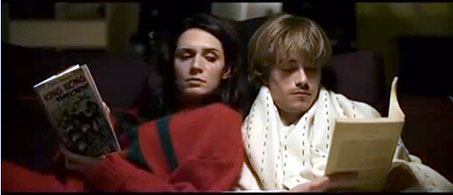 |
|
Paulo knows that he likes men yet tries to maintain a conventional, heterosexual relationship. Anka has had enough and throws Paulo out. Laughably, Paulo is so oblivious to the consequences of his actions. (“But we’re so good together,” he insists as his girlfriend slams the door.) He shows up at Ilir’s doorstep with his bags and asks if he can move in. Ilir is less than thrilled. “All we did was have some fun, that’s all,” he tells the desperate, but also smitten, young lad. “Take care of me?” he pleads. “You’re all I got.” When that doesn’t work, Paulo imitates a child’s voice and asks, “Blow jobby?” |
|
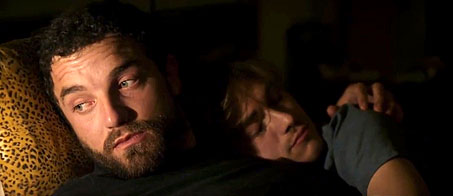 |
|
His persistence pays off because Ilir lets him stay and they become very affectionate lovers. Their relationship is quite charming actually; they have a lot of fun and it’s fun to watch them. Paulo ties a lock of his hair around one of Ilir’s toes and says “I’m attaching myself to you.” He’s a little clingy but he’s so cute about it. He’s lovable and annoying all at the same time. “Do you love me?” he asks. Ilir smiles and responds, “Not at all.” |
|
|
|
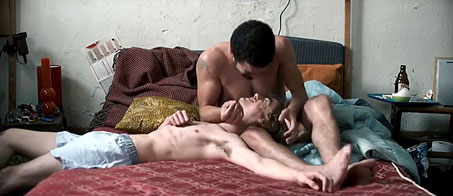 |
|
Ilir leaves the country for a few days to play a music gig. Their long and playful kiss in the train station ends with my favorite image from the film: Ilir moving away backwards from Paulo down the escalator. It is a very romantic moment with flashes of humor and the director holds the widescreen image for a long time. And then… Ilir doesn’t come back and the entire tone of the movie changes. |
|
|
|
|
|
The first act emphasized Paulo’s childish need to be taken care of. Their roles are reversed in part two. Ilir was busted for hash possession and he made things worse by resisting arrest. He has been sentenced to eighteen months in prison. Their visits are portraits in anguish. Thinking only of his own pain, Paulo blames Ilir for getting arrested and cries like a baby. Ilir, needing to project a tough image in order to survive behind bars, asks Paulo to stop coming. After Ilir has served his sentence, he acts like Paulo did in the beginning; trying to be cute so that he can get back into his life. |
|
|
|
|
|
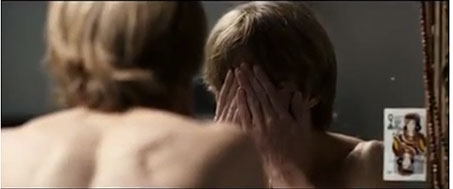 |
|
The acting is outstanding; Malliarakis and Gouix are terrific as Paulo and Ilir. Their chemistry together lights up the screen. Each is equally adept at expressing both joy and misery. When Ilir inexplicably disappears, Malliarakis beautifully conveys the lad’s panic. His moodier scenes avoid descending into complete melodrama with the addition of such eccentric touches as the metal chastity device that he needs the key for. Gouix also excels at showing both Ilir’s tough and teddy bear sides. Every look that they give is packed with meaning and they command each one of their close-ups. Director Lambert trusts his actors and many scenes are captured in long takes, preserving the intimacy of their performance. The photography – which could be a little lighter in some scenes – is shot with a painter’s eye for composition and heightens the mood. |
|
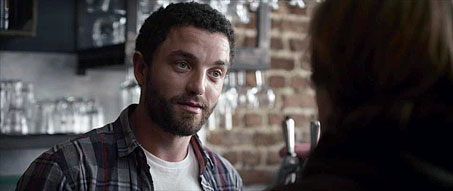 |
|
A number of mainstream reviews have compared Beyond The Walls favorably with Weekend and Keep The Lights On. There are certainly similarities, and it’s refreshing to see them being noted by straight reviewers (a phenomenon mostly unheard of even a decade ago). While it might not reach the same heights as the above-mentioned films, Beyond The Walls comes pretty damned close. Queer cinema has been enjoying quite the renaissance these past couple years. |